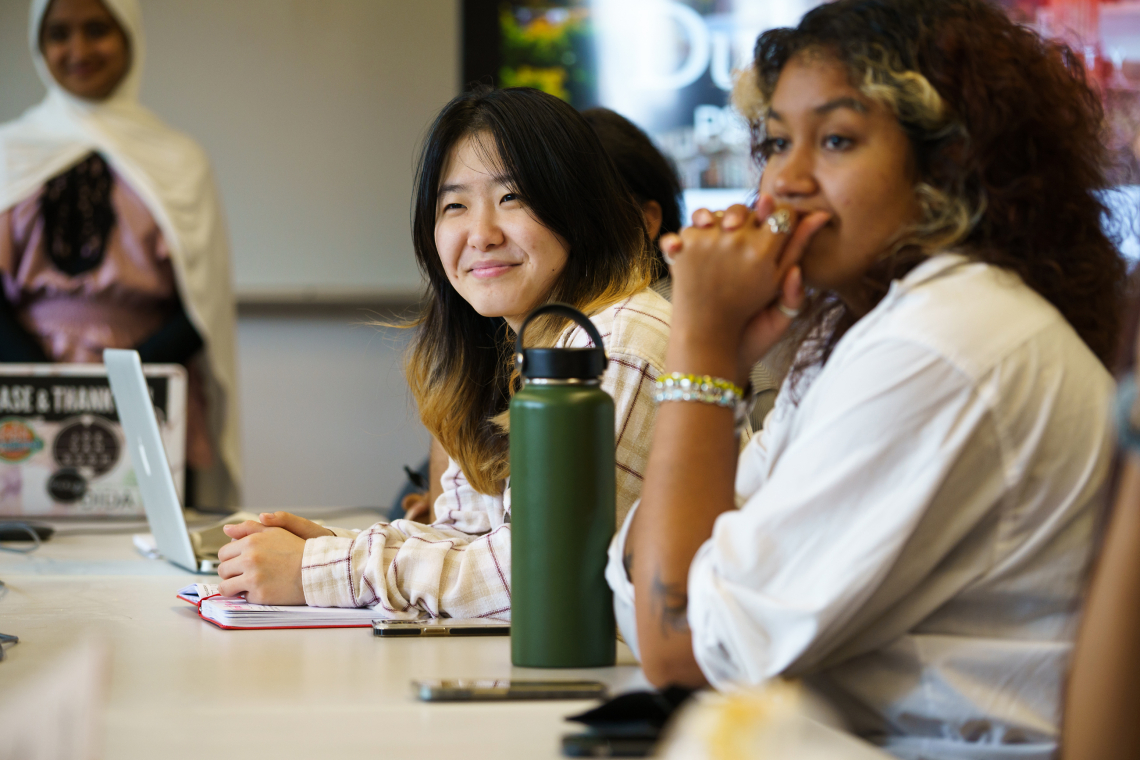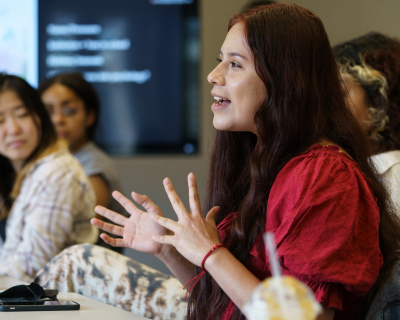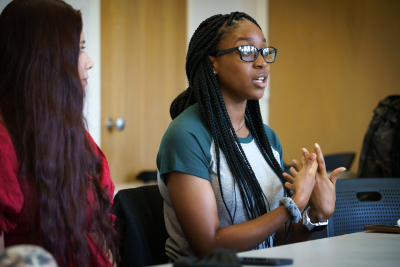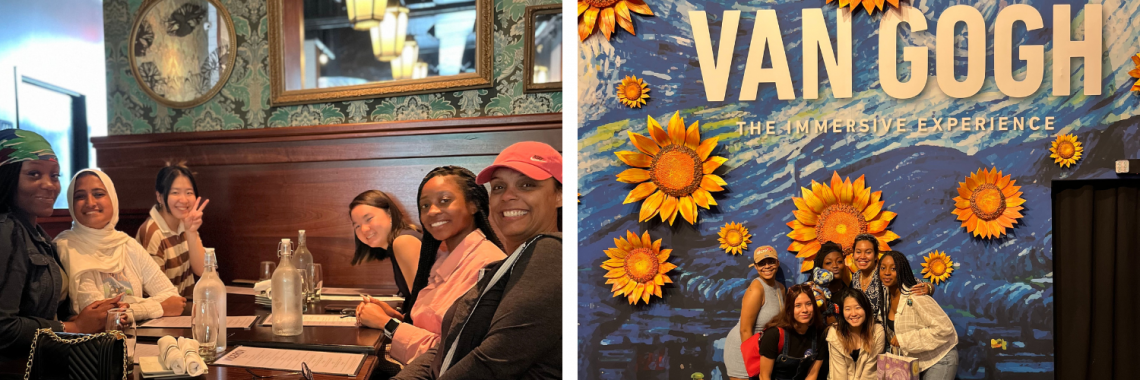Summer Research Program Tackles Longstanding Issues in Diversifying Undergraduate Training Opportunities

On a sweltering morning in late May, eight undergraduate students from across the country gathered in a third-floor classroom in the Reuben-Cooke Building — a space recently renamed in honor of one the “First Five” Black undergraduate students at Duke.
The classroom is rife with first-day jitters. Just days before, the newly arrived interns — many of whom are first-generation students from HBCUs and small liberal arts institutions — moved into dorm rooms on Duke’s West Campus. The diverse cohort was selected from a pool of over 400 applicants who travelled to Duke to embark on a 10-week summer research program.
The program, led by three faculty members from the Department of Psychology & Neuroscience — Makeba Wilbourn, Sarah Gaither and Greg Samanez-Larkin — has one main goal: to mentor the next generation of diverse STEM scholars.
Leveling the playing field
Wilbourn, Gaither and Samanez-Larkin represent three distinct and popular areas of research: developmental psychology, social psychology and neuroscience/cognitive neuroscience, respectively.
Their sought-after expertise and shared motivation to diversify psychology and neuroscience uniquely qualified the trio for a National Science Foundation award designated to address underrepresentation of marginalized groups within STEM fields. The NSF grant funds the summer program, now in its third and final year.
“We know that students of color often start undergraduate research significantly later than their white or higher income peers,” Wilbourn shared. “How we get ‘students of other’ and first-generation students in our labs is complicated and nuanced and has a racialized lens. It’s about inequity and disparities in opportunities.”
As a “first-gener” herself, Wilbourn believes a pedagogical and a philosophical shift is required from faculty to actively create more racially and socioeconomically diverse labs. “Diversity adds so much richness, and is absolutely essential to having good quality research, especially when studying human behavior,” she said.
Jaime Castrellon, a Duke Ph.D. alumnus and former program mentor, believes the internship opportunity reveals to interns the inner workings of academia.
“Often times, what it takes to become a successful scientist in academia feels like insider knowledge that is not accessible to just any undergraduate student,” Castrellon said. “Navigating the cultural world of academia can present unique challenges for students who also belong to groups that are underrepresented in scientific research.”
Castrellon, also a first-generation student, views the program as an opportunity to overcome certain structural barriers by guiding underrepresented students in both the research process and in their professional development as scientists.
Gaither agrees: “We really view this program as at least one step in trying to level out the playing field,” she said.
An intentional design
The summer program takes a two-pronged approach to teaching: provide formal research training to underrepresented undergraduate interns (including women, minorities and persons with disabilities) and provide mentor training for current Duke Ph.D. students and postdoctoral fellows on how to best work with students from marginalized backgrounds.
“None of us are trained as graduate students on how to mentor others,” Gaither shared. “We become faculty and work with Ph.D. students, but we don’t receive direct training on how to best maneuver a mentorship role — that's one thing Greg, Makeba and I really want to change.”
Before becoming a graduate student mentor in the program, Castrellon was largely unaware of empirical research on mentoring practices, and typically went with “his gut” on what felt right. Later, he learned that approach does not always lead to the best path.
“Through discussions with the program’s faculty leaders and fellow mentors, I learned about evidence-based strategies that involve incorporating culturally-relevant and socioemotional mentoring,” Castrellon said. “This knowledge and broader understanding of evidence-based mentoring has helped me learn how to focus my efforts in specific ways to support mentees’ confidence and self-efficacy.”
Since its inception, the summer research program has been designed with intention. Every other week, all members meet for lab: interns, graduate students, post-doctoral fellows, lab managers and faculty. Those all-group meetings are a space to talk about overarching themes and persistent microaggressions within academia: How do you function being underrepresented in an academic space? What are some coping mechanisms that you can use when a faculty member or a student wrongs you based on a given identity? What are some of the unspoken language cues that people use in higher ed spaces that students from first-generation backgrounds might not be attuned to?
Interns also gain technical skills by working directly with ongoing projects in faculty labs, attending statistical workshops and talks about research and writing, practicing how to present work at national conferences, and learning how to complete graduate school application packets.
On alternate weeks, the program’s meetings are reserved for Wilbourn, Gaither and Samanez-Larkin and the graduate student mentors from their labs to provide space for feedback on how the mentors are working with the interns. Are the relationships developing? Is there personal and professional rapport? What additional tools can be provided for greater success in working with students from non-research intensive backgrounds? Is there a certain skill that is challenging to teach that can be approached differently?
“These mentor meetings provide a unique community of practice to talk openly about the joys and challenges of mentoring effectively,” said Samanez-Larkin. “It’s a highlight of my year. I wish we had more space for these conversations at a broader scale on campus throughout the year.”
Compensation as a nonnegotiable
The hundreds of applications that the program receives each year demonstrate a significant need for paid summer internships in psychology, particularly for students from limited-income backgrounds. “How can we expect students to work and gain research skills without being paid?” Gaither asked.
The program covers all costs for its interns travel to and from Duke, housing accommodations, and health fees in case students need to visit the Student Wellness Center during their stay, on top of offering a $6,000 stipend.
Receiving a stipend is critical for the interns because it provides the time and ease to focus on larger questions about their futures — a reality many students from more privileged backgrounds are granted, whether they’re paid or not.
“Many of our summer interns simply have not had time for reflection because they’re full-time students, working their way through college,” Gaither noted.
The program’s mentors make space for interns to wonder about personal dreams — like what they want to research — and to ask important career questions, like the difference between a master’s and doctoral degree and the range of potential paths following an undergraduate degree in psychology. The mentors also provide tailored guidance and feedback along the way, ushering students in to a new and exciting stage of their academic and professional careers.
Bringing new skills beyond Duke
The program’s interns are taking what they’ve learned at Duke back to their home institutions, and then on to graduate school and into exciting job prospects.
Program alumnus Chase Garvey graduated from Ithaca College in 2022 with a major in psychology and minor in environmental studies. He now works as the lab manager for the Human Diversity Lab at Princeton University under Kristina Olson, a MacArthur Grant recipient and one of the world’s foremost experts on gender development and well-being in transgender, gender nonconforming and intersex children.
“I learned a lot of valuable skills during my time in the summer program at Duke,” Garvey shared. “Although I had done research prior to my internship, I never got to do any of the ‘behind the scenes’ work that I was exposed to during my time there.”
The summer program allowed Garvey to think of his own research questions, design the type of study he wanted to work on, and complete the Institutional Review Board (IRB) approval process for the first time. He expanded his knowledge in coding via the R programming language and received feedback on how to best format a CV.
“My mentor, in particular, pushed me to be my best and really inspired me to want to continue my path in research,” Garvey shared.
Jada Brinner, a summer 2022 intern and a senior psychology major from Mississippi State University, shared that the most valuable skill she gained from the program was improving her ability to speak in front of others.
“I wouldn’t say that I am afraid of public speaking, but in close-knit settings I always held back and never shared my ideas or thoughts,” she said. “This summer, with the support of my peers and mentors, I was able to grow tremendously in this area. I have a ton to say and I’m not so afraid to do that anymore.”
Brinner also learned that research is a more complicated process that she initially understood. “There is so much behind the scenes work — from counterbalancing to setting up the study — it is one hundred percent a process.”
Community that lasts
While acquiring practical research skills is at the core of the summer program, the community of scholars and the relationships formed among peers and mentors sustains the work.
The program offered coordinated social events like meals exploring diverse local cuisine and a visit to the Van Gogh Immersive Experience to provide rich experiential learning opportunities, as well as time for interns and mentors to bond outside of the lab.
“The other interns and I clicked from the beginning,” Brinner shared. “We supported each other through everything, and it was so great to see each other grow. I couldn’t be prouder of them.”
Looking back on those first-day jitters seems like a distant memory for Brinner now.
"With my mentors and my lab PI, I was on edge at first,” she confided. “I wanted to be ‘impressive,’ but at the end I learned from them that I can just be myself and that’s enough. I truly look up to each of them. Their passion for others and research inspires me, and I want to take what they taught me and share it with others.”





